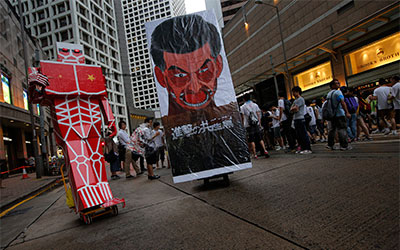In “Dark Clouds on the Horizon,” the Hong Kong Journalists Association’s latest annual report, the group warns that China is tightening its grip over Hong Kong media. The findings come at a time when attacks on a pro-democracy media group, Next Media, have raised fears of aggression against news outlets known for being critical of China.
The report finds that press freedom in the territory of Hong Kong–which was granted the right to manage its domestic affairs under a “one country, two systems” framework when China took back control from the British in 1997–is under assault both from the local government and from Beijing.
Locally, Hong Kong’s government has proposed or passed laws that would restrict reporting activities. The vague wording of recent amendments to the city’s privacy law could subject journalists to five years in jail or fines up to 1 million Hong Kong dollars (US$129,000) if they reveal information that “causes psychological harm” or “causes loss.” The government has also proposed new rules that would bar the public from accessing the residential addresses and identification card numbers of company directors, which could prevent journalists from uncovering wrongdoing and corruption. Company records in Hong Kong played a crucial role in The New York Times and Bloomberg investigations into the family wealth and business relationships of former Premier Wen Jiabao and current President Xi Jinping. In response to media criticism, the government in March postponed discussion of the new rules.
Also, the chief executive of Hong Kong, Leung Chun-ying, has personally sought to pressure the media into not criticizing his leadership. In April and May 2012 he issued four letters to two media outlets–Hong Kong Economic Journal and Next Media’s Apple Daily–to complain about their reporting on his election. In February, Leung’s lawyers sent a warning letter to a writer for Hong Kong Economic Journal, Joseph Lian, over a commentary suggesting that Leung had links with triads, which Leung has denied. The journal’s chief editor, Chan King-cheung, said the letter asked the Journal to retract the article and not repeat such comments, according to news reports.
Meanwhile, Chinese officials have detained or obstructed Hong Kong journalists reporting on sensitive issues in the mainland. This included the September 2012 detention of two Ming Pao Daily News reporters for 44 hours by Hunan province authorities, following their interview with the family of late dissident Li Wangyang, and the obstruction of four reporters covering the flag-raising ceremony in Tiananmen Square on the morning of June 4.
The Hong Kong Journalists Association also argues that Hong Kong media owners are being “co-opted” into the central elite. Starting in 2007 and again this year, half of Hong Kong media owners have been appointed to the main political bodies of China–the National People’s Congress (NPC) and the Chinese People’s Political Consultative Conference (CPPCC).
All this comes against the backdrop of rising attacks on journalists in the past year, with 11 incidents in Hong Kong and seven in mainland China, according to media reports and HKJA. In response to questions about these attacks from journalists, Leung has said only that the local government would “follow up” on the cases. Of the 11 cases that took place in Hong Kong, two have concluded with punishment for the attackers.
The Hong Kong Journalists Association anticipated some of these problems when they started releasing their annual reports in 1994, three years before the former British colony returned to Chinese rule. The reports are aimed at “pressur[ing] the Hong Kong government to improve the environment for press freedom.” Over the years, each report has noted a decline in that environment. In April 2012, an HKJA survey showed that almost 60 percent of respondents believed press freedom would be further restricted under incoming Chief Executive Leung. It looks as though the concerns have borne out.
